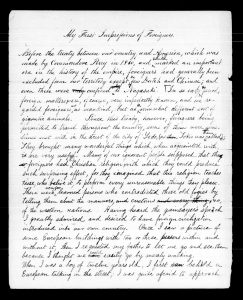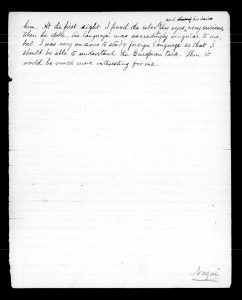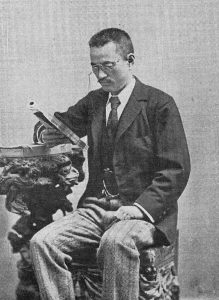Nagai

 My First Impressions of Foreigners
My First Impressions of Foreigners
(Transcribed by Stephen Hu, Aishwarya Sridhar, Camille Romano, and Jin D. Sebastian)
Before the treaty between our country and America, which was made by Commodore Perry in 1860, and which marked an important era in the history of the empire, foreigners had generally been excluded from our territory except a few Dutch and Chinese; and even these were confined to Nagasaki. In so early a period, foreign matters were of course very imperfectly known, and we regarded foreigners not as mankind, but as a somewhat different sort of gigantic animals. Since this treaty, however, foreigners being permitted to travel throughout the country, some of them were sometimes met with in the street of the city of Yedo, ( as Tokio was then called); They brought many wonderful things which, when acquainted with, are very useful. Many of our ignorant people supposed that the foreigners had the Christian religion, with which they could produce such surprising effect, for they imagined that this religion teaches those, who believe it, to perform every unreasonable things they please. There were very few learned persons who contradicted those old fogies by telling them about the manners, customs, etc, of the western nations. Having heard the gainsayer’s speech I greatly admired and desired to have foreign civilization introduced into our own country. Once I saw a picture of some European buildings with two or three persons within and without it, then I requested my father to let me go and see them because I thought we could easily go by merely walking. When I was a boy of twelve years old, I first beheld a European talking in the street; I was quite afraid to approach him. At the first sight I found the color of his eyes and his hair very curious, when he spoke, his language was exceedingly singular to me, but I was very anxious to study foreign language so that I should be able to understand the European talk. Then it would be much more interesting for me.
Nagai
-
 NAGAI KYUICHIRO 永井久一郎 (1852-1913)
NAGAI KYUICHIRO 永井久一郎 (1852-1913)Born in present-day Nagoya in Aichi prefecture. He studied at Daigaku Nanko and Keiko Gijuku around 1870, then studied English and Latin in the U.S. Upon return in 1873, he served the Ministry of Engineering and Ministry of Education, and helped found the National Library and Museum. Later in 1897, he became the head of the Shanghai branch of Nippon Yusen (Japan Mail Shipping Line).
-
This writing by Nagai, reveals the way in which the treaty impacted the relationship between foreigners and the Japanese before and after the treaty made by Commodore Perry in 1860. Nagai reveals the very negative view of foreigners that the Japanese held prior to the treaty. He states that they were regarded “not as mankind, but as a somewhat different sort of gigantic animals”. This shows the unfamiliarity that the Japanese had with foreigners. Nagai also discusses the lack of foreigner presence in Japan prior to the treaty. Few foreigners existed in Japanese territory, and those who did live in Japan were confined to Nagasaki. This limited the interactions the Japanese had with foreigners and fueled the sense of unfamiliarity between the different cultures. The lack of interaction between the Japanese and the foreigners likely contributed to the negative impressions that the Japanese held of the foreigners. For example, the Japanese feared the Christian religion as they believed it teaches followers to “perform very unreasonable things”. Nagai reveals that after the establishment of the treaty, foreigners’ presence was increased dramatically in Japan and foreigners were able to travel throughout Japan, increasing the opportunities for the two peoples to interact. Nagai speaks about the Western items that were brought by the foreigners that the Japanese found useful. These interactions between the Japanese and the Western foreigners increased communication and familiarity between the two cultures, leading to an improved relationship.
Nagai also speaks about his own curiosity about foreigners. He states that he wishes for Japan to adopt aspects of foreign civilization. He reveals anecdotes from when he was younger and discusses his curiosity, even at a young age, regarding the foreigners. He discusses his first encounter with a foreigner and the differences he noted in appearance and language compared to his own Japanese culture. He mentions that despite the unfamiliarity, he was curious about the European language and wished to learn it.
Although the Japanese society as a whole had a negative opinion on foreigners prior to the establishment of the Treaty in 1860 by Commodore Perry, there were some individuals such as Nagai, who were curious about the foreigners and had an interest in learning the European language. Nagai’s writing shows the impact that the Treaty had on improving the relationship between the Japanese and the Western people.
-
Inferring from the passage, Nagai is likely on the younger side as he is very welcoming and even encouraging of Western culture. Based on generalizations, the older generation, especially ones that experienced isolation during the Edo period, were not as welcoming to foreign influence, which Nagai even notes saying that foreigners are more a “different sort of gigantic animals” and were “imperfectly known.” Nagai even criticizes the “old fogies” by saying they dislike foreigners but are ignorant about the customs of foreign nations. However, it is also possible that Nagai simply had a curious and open personality ever since he was young as he recalls a story where he saw a photo of Europeans and wanted to meet them. Then, at twelve years old, he would encounter a European in person and would again be curious and though hesitant, eager to meet him. Though, Nagai definitely praises Europeans and thinks of their culture highly. He wants the culture to come to Japan and blend it with Japan’s own culture or possibly even “upgrade” it as he may think of some aspects like foreign technology as superior. Thus, it makes sense that he was one of Griffis’ students as his curiosity about foreign nations likely never left him and even at an older age wanted to continue learning and interacting with foreigners. Nagai does seem to have a deeper understanding of Western culture however; he realizes that Christianity is not simply promising believers to “perform every unreasonable things they please” but is rather just a religion guiding its believers just as any other religion. So while Nagai does praise the advancements European nations can bring, he is also likely aware of the potential drawbacks and the conditions needed to implement those changes.
-
Inferring from the passage, Nagai is likely on the younger side as he is very welcoming and even encouraging of Western culture. Based on generalizations, the older generation, especially ones that experienced isolation during the Edo period, were not as welcoming to foreign influence, which Nagai even notes saying that foreigners are more a “different sort of gigantic animals” and were “imperfectly known.” Nagai even criticizes the “old fogies” by saying they dislike foreigners but are ignorant about the customs of foreign nations. However, it is also possible that Nagai simply had a curious and open personality ever since he was young as he recalls a story where he saw a photo of Europeans and wanted to meet them. Then, at twelve years old, he would encounter a European in person and would again be curious and though hesitant, eager to meet him. Though, Nagai definitely praises Europeans and thinks of their culture highly. He wants the culture to come to Japan and blend it with Japan’s own culture or possibly even “upgrade” it as he may think of some aspects like foreign technology as superior. Thus, it makes sense that he was one of Griffis’ students as his curiosity about foreign nations likely never left him and even at an older age wanted to continue learning and interacting with foreigners. Nagai does seem to have a deeper understanding of Western culture however; he realizes that Christianity is not simply promising believers to “perform every unreasonable things they please” but is rather just a religion guiding its believers just as any other religion. So while Nagai does praise the advancements European nations can bring, he is also likely aware of the potential drawbacks and the conditions needed to implement those changes.
As nearly all of the higher class in this country, that is, chiefly Samurais, had been educated in the Chinese style in which system they learned that the Chinese and the Japanese were the most highly civilized nations, and all other foreign nations were barbarians or savages; for this was the case about two thousand years ago. Since they did not know how to improve their own mistakes, they have retained the impressions which they were taught by their ancestors, till a few years ago. While I was young, that is about ten or eleven years old, as nearly all men and women who surrounded me were among three obstinate people, any first impression was like them, and I also heard from them that the foreigners were very wild and ferocious like brute(sic). Then I did not know the distinction between English, French, Russians, etc, but I understand all of them to be only one tribe to which the term, Ijin, which means “different from human being,” was applied. When I saw a picture, which represented foreigners, I thought that they were really savages, as their dress, complexion, hairs, seemed very envious, and great many other things. At the same time I heard that they could not bend their knees, inasmuch as they sat on chairs. Therefore, we disliked to enter into intimate friendship with such nations, although they were always contriving to do so.